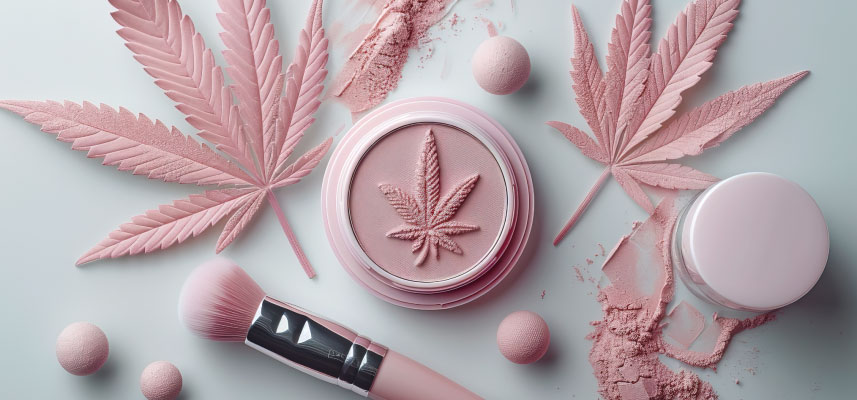A Growing Trend in Skincare and Beauty
The cosmetics industry has witnessed a surge in the use of cannabis-derived ingredients, particularly cannabidiol (CBD) and hemp seed oil, as consumers increasingly seek natural and effective skincare solutions. With its anti-inflammatory, antioxidant, and moisturizing properties, cannabis is becoming a key ingredient in a variety of beauty and skincare products.
Key Cannabis-Derived Ingredients in Cosmetics
CBD (Cannabidiol):
CBD is a non-psychoactive compound derived from the cannabis plant, known for its therapeutic properties. In cosmetics, CBD is prized for its ability to soothe the skin, reduce inflammation, and combat signs of aging. It can be found in products like serums, creams, lotions, and facial oils.
Hemp Seed Oil:
Hemp seed oil is extracted from the seeds of the hemp plant and is rich in essential fatty acids, vitamins, and antioxidants. Unlike CBD, hemp seed oil contains no cannabinoids but is highly valued for its moisturizing and skin-nourishing properties. It is commonly used in moisturizers, lip balms, and hair care products.
Terpenes:
Terpenes, the aromatic compounds found in cannabis, are also being incorporated into cosmetics. Terpenes like limonene and linalool not only provide a pleasant fragrance but also offer potential benefits such as calming effects and skin protection.
Benefits of Cannabis in Cosmetics
Anti-Inflammatory Effects:
CBD is renowned for its anti-inflammatory properties, making it effective in treating skin conditions like acne, eczema, and psoriasis. By reducing inflammation, CBD can help calm irritated skin and prevent flare-ups.
Antioxidant Protection:
Both CBD and hemp seed oil are rich in antioxidants, which help protect the skin from free radicals and environmental stressors. This makes cannabis-infused products beneficial for preventing signs of aging, such as fine lines, wrinkles, and loss of elasticity.
Moisturization and Hydration:
Hemp seed oil is an excellent moisturizer due to its high content of omega-3 and omega-6 fatty acids. It helps maintain the skin’s natural barrier, preventing moisture loss and keeping the skin hydrated and supple.
Soothing and Calming:
CBD has a calming effect on the skin, making it ideal for sensitive skin types. It can reduce redness, irritation, and the appearance of puffiness, promoting a more even complexion.
Acne Management:
CBD's anti-inflammatory and sebum-regulating properties make it effective in reducing acne. It can help balance oil production, reduce inflammation associated with acne, and minimize the appearance of blemishes.
Scalp and Hair Health:
Cannabis-infused hair care products, such as shampoos and conditioners, can improve scalp health by reducing inflammation and dryness. Hemp seed oil, in particular, helps nourish the hair and scalp, promoting stronger, shinier hair.

Popular Cannabis-Infused Cosmetic Products
Facial Serums and Oils:
CBD-infused serums and oils are popular for their anti-aging and soothing effects. They are often used to hydrate the skin, reduce redness, and improve skin texture.
Moisturizers and Creams:
Hemp seed oil-based moisturizers are known for their ability to lock in moisture without clogging pores, making them suitable for all skin types, including oily and acne-prone skin.
Lip Balms:
Hemp seed oil is commonly used in lip balms for its moisturizing properties, helping to keep lips soft and hydrated.
Body Lotions and Balms:
CBD and hemp seed oil are used in body lotions and balms to provide relief from dry skin, soothe irritation, and improve skin texture.
Hair Care Products:
Hemp seed oil is found in shampoos, conditioners, and hair masks, helping to nourish and strengthen hair while promoting scalp health.
Bath Bombs and Soaks:
CBD-infused bath bombs and soaks are designed to provide relaxation and relief from muscle tension, while also moisturizing and soothing the skin.
Regulatory Considerations and Challenges
Regulatory Status:
The regulatory landscape for cannabis-derived ingredients in cosmetics varies globally. In the United States, for example, the FDA has not approved CBD as an ingredient in cosmetics, although it is widely used. In contrast, hemp seed oil, which contains no THC or CBD, is generally recognized as safe and is legal for use in cosmetics.
Labeling and Marketing Claims:
Companies must be cautious with their marketing claims, ensuring they do not imply that their cannabis-infused products can treat or cure medical conditions unless supported by clinical evidence. Misleading claims can lead to regulatory action.
Quality Control:
Ensuring the quality and consistency of cannabis-derived ingredients is critical. Consumers should look for products that are third-party tested to verify the concentration of CBD and the absence of contaminants such as pesticides and heavy metals.
Consumer Trends and Market Growth
Rising Demand for Natural Products:
The growing demand for natural and organic skincare products has fueled the popularity of cannabis-infused cosmetics. Consumers are increasingly seeking out products that are free from harsh chemicals and synthetic ingredients.
Celebrity Endorsements and Influencers:
Cannabis-based cosmetics have gained mainstream attention, partly due to endorsements by celebrities and influencers. This has helped normalize the use of cannabis in beauty routines and increased consumer interest.
Sustainability and Ethical Considerations:
Hemp is a sustainable crop, requiring less water and fewer pesticides compared to other plants. This aligns with the values of eco-conscious consumers who prioritize sustainability in their purchasing decisions.
Growth in the Luxury Market:
Cannabis-infused cosmetics are also making their way into the luxury market, with high-end brands incorporating CBD and hemp seed oil into premium skincare and beauty products.
Conclusion:
Cannabis is making a significant impact on the cosmetics industry, offering a range of benefits from anti-inflammatory and antioxidant properties to deep moisturization. As consumers continue to seek out natural and effective skincare solutions, cannabis-derived ingredients like CBD and hemp seed oil are becoming essential components in beauty and skincare products. However, navigating the regulatory landscape and ensuring product quality remain critical challenges for manufacturers.


